
With three minutes left in the first half of a game against the University of Findlay, Kari Daugherty of Ashland, the best rebounder in all of Division II women’s basketball -- and one of the best scorers too -- went up for the ball. At the same time, though, a Findlay player’s foot hit her knee. Nine players sprinted down the court, and within nine seconds, Findlay had scored on a layup and drawn a foul.
But nobody was watching. Just about every fan -- all 1,072 of them at Kates Gymnasium -- was watching the one player who didn’t sprint down the court.
Daugherty is the defending Division II female athlete of the year and Division II women's basketball player of the year. She is averaging 22 points and 15 rebounds on a team that, right now, is ranked No. 1 in the country with a record of 17-0. They are playing the second best team in the Great Lakes Intercollegiate Athletic Conference tonight, and they are beating that team 40-18 after jumping out to a 20-0 lead.
All season long, this team, the university and the entire community, has had faith in the fact that this women's team would win a national championship. They had come so close the year before, losing to Shaw University in overtime in the national championship game, but had returned all but one player.
But faith, as everyone on the Ashland women's basketball team knows, gets tested. They've read the Bible in team Bible studies (led by Daugherty). They know of trials and tribulations. Coach Sue Ramsey has a sign hanging in her office that says, "If God brings you to it, He will bring you through it."
These are the things they all must be thinking right now, as the undisputed leader of that team is on the floor.
Daugherty tries to stand up but falls back down. That's when the tears start to stream down her face.
Ashland University is a mid-sized school in Central Ohio. It is located at the midpoint between Cleveland and Columbus. The community itself is very conservative. Not only are there no Democrats in office in the city or the county, no Democrats ever even run for office.
About the only thing more numerous in Ashland than churches are pizza places.
Still, while Ashland University is affiliated with the Brethren Church, it is not a particularly religious university. Students are not required to attend chapel. There are, indeed, students of many different faiths on campus. While the vast majority is Christian, there is a visible Muslim population on campus thanks to a robust international student program.
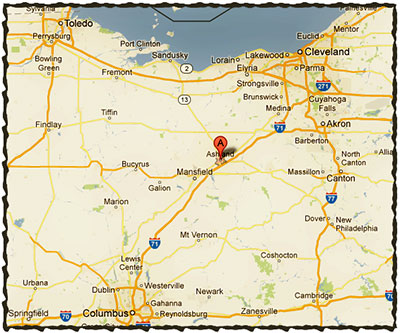
The only religion requirement at AU is within the curriculum; every student at Ashland University must take a religion course, although they have six to choose from: Exploring the Bible, Exploring Christian Ethics, Exploring World Religions, The Gospels, Exploring Christian History in a Global Context or Thought and Belief, the latter offered by the philosophy department.
And yet the women's basketball team, led by Ramsey, has become the spiritual epicenter of the entire city. The crowds in Kates Gymnasium, a relic from the 1960s that hasn't been upgraded (but will be completely renovated once this season is over, thanks to the success of the women's program), consists mostly of townies, as the students would call them. Those townies always outnumber the students by a large amount. And because Ashland is the self-proclaimed World Headquarters of Nice People, Kates Gymnasium is probably the most hospitable road venue for just about any team in the country. Sure it's loud, but opposing players are never, ever, ridiculed by the crowd.
All of this starts with Ramsey, who has built a program during the past 18 years on faith in God. It's a philosophy that, over the last several years, has helped the program reel in Division I players who didn't like the big school atmosphere.
This season, they have routed everyone they have played, even ranked teams on the road. It hasn't even been a question as to whether the Eagles would advance to the Elite Eight in San Antonio again. It's almost seemed like a forgone conclusion that the team would easily make it to the national championship game. Because with Daugherty and the return of senior Daiva Gerbec, who missed all of last year's run due to an injury, this team is invincible.
But all of that is forgotten as Daugherty is on the floor.
Is there a Bible passage that sums up this Eagle basketball team?
Ramsey doesn't even have to think about it.
Hebrews 12, verses one through three:
It's an exhortation to be constant in faith, to persevere.

That passage also talks of a great cloud of witnesses. It's something this women's team has developed the past two years. When the team beat Wisconsin Parkside to secure a trip to the Elite Eight in 2012, it did so in front of a raucous crowd of more than 2,600.
Now that crowd is silent. Ramsey is the first to Daugherty's side. She helps her stand up, is her crutch for the first couple steps. Then the athletic trainers take over.
Daugherty is scared. She's afraid her basketball career is over. She felt something give in her knee, and that first time she tried to stand up, she felt her knee wobble and move in ways it didn't normally move. She talks to God all the time, and now is no different.
But now she has hundreds of people joining her. There are prayers going up from Daugherty's family and her fiancé, who sit center court, about five rows up. There are prayers from the dozens of former AU women's basketball players who sit a bit more toward one end of the gym, about 10 rows up. There are prayers on the Eagles bench. And there are prayers from Ramsey.
Daugherty transferred to Ashland University after playing for two years at the University of Dayton, an Atlantic 10 school. She had gone to play DI basketball with her older sister, but her sister had graduated and Daugherty didn't like how she struggled in her faith at a large school in a big city.
After all, she was a small-town girl. She grew up in Fresno, Ohio, a small town of 3,500 in northeast Coshocton County, close to the largest settlement of Amish in the world.
She knew about Ashland University and Ramsey's program because of Jena Stutzman, a former AAU teammate who had transferred to Ashland from Kent State. Stutzman was from nearby Berlin in Holmes County, which is smack dab in the middle of the largest Amish settlement in the world.
Stutzman came to Ashland because she wasn't happy, spiritually, at Kent State. She told The Collegian, the college's student newspaper, the Ashland community was a much better place for her.

"The campus, the coaches, the team, just everything about it," she said in a story that Collegian sports editor Chris Bils wrote while the team was in San Antonio, after the Eagles had advanced to the Final Four. "I enjoy it. I love playing the game of basketball and just being on a team with a Christian coach and Christian teammates and everything like that makes the experience even better."
Stutzman chose Ashland partly on a recommendation of her high school basketball coach Dave Schlabach. He recommends Ramsey and the Eagles to many of his players because the communities are similar. Berlin is a tiny village in eastern Holmes County, and is a very religious, very conservative community.
"The way Sue runs her program, she really cares about her players," says Schlabach, whose team just lost in the round of eight in Ohio's high school basketball tournament after two consecutive state championshiops. "I can't say that about every college coach."
"We have a faith-based program here as well, and it just seems like they really fit hand-in-hand. It's that ability to be in a gym full of people who believe like you do; that makes for a great college experience."
Daugherty never regretted her decision to leave Division I basketball for Ashland.
"The program that Coach Ramsey has built, girls aren't afraid to express their faith," Daugherty says. "In college, that can be something that is hard for college athletes to talk about. In our society, it's not socially acceptable to be so open about your faith, but Coach Ramsey has created a program where it is welcomed and encouraged."

This is how welcome and encouraged it is: During the second round of the NCAA Division II tournament in March 2012, Daugherty played one of the most amazing 10 minutes of basketball ever played by anyone. She scored 11 consecutive points. She grabbed huge rebounds. As time was expiring and the Eagles were up by two points over Quincy University, she ripped what would have been an offensive rebound away from three Quincy players.
After the buzzer sounded, after AU had clinched a spot in the Sweet 16 for the first time in school history, she ran to the front of the handshake line. She buzzed through it, then ran to center court, where she hugged teammate Ashley Dorner. By the time she got to Ramsey, she was in tears.
Ramsey asked if Daugherty was all right.
"And she said, ‘Coach, I heard God's voice. The Lord spoke to me,'" Ramsey says. "
Then Daugherty told the entire team in the locker room. Then she told her mom. Then she told all the assembled media in a post-game press conference. She's repeated the story dozens of times.
"To know that the most intense time in a game, her mind and mindset is so in tune with the Lord," Ramsey says now, "the veil came back and that communication was real and she absorbed every minute of it."
This program was not developed overnight. It's taken Ramsey 17 years to get to this point. In her previous 16 years, her teams made the NCAA tournament exactly twice, winning just one game. Then in 2012, they won five and barely lost the national championship game.
Ramsey started at Ashland in 1995. She came to the Division II world after leading the University of Dayton (sound familiar?) for eight seasons. Ramsey left Division I for many of the same reasons several players have done so in the past couple years, most notably Stutzman and Daugherty.
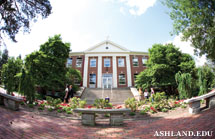
"I hit a point in my life when I took a step back and asked, Why do I coach?" Ramsey says. "What is the most important thing about coaching for me? It wasn't the game. It was the opportunity to be involved in these young ladies' lives, to watch them grow through the avenue of the game."
She also wanted to be somewhere she could be open about her faith.
"I have friends at other divisions, at state schools, where they're not allowed to pray with their kids," she says. "I've always wanted to be in an environment where it was supported but not expected."
At Ashland, her first three years were good. Her teams won 16, 18 and 17 games respectively. They made the conference tournament, although didn't advance far. The next three were rough. The Eagles went a combined 28-52. The program's only 20-win seasons (at least up until the 2011-12 season) occurred consecutively in 2003 and 2004, but after that, Ashland was the definition of mediocrity. They would win 17 or 19 games one season, but then drop to .500 the next, with 14 wins. The year before Jena Stutzman transferred to Ashland, the Eagles were 14-14. They had a freshman on that team by the name of Daiva Gerbec, who had been recruited hard by several Divison I programs but chose Ashland because of Ramsey and the program she had built.
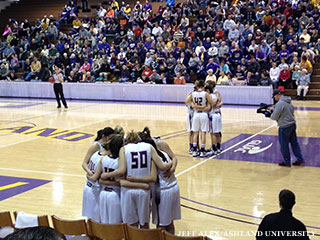
The next season, with Gerbec in the post and Stutzman on the wings, the Eagles were one of the top teams in the GLIAC. They finished 19-10 on the season, but didn't go as far as they could or should have. That's because Stutzman injured her knee. At home in Kates Gymnasium. Against Findlay.
The night Stutzman blew out her knee, Ramsey took a phone call. It was from Stutzman's AAU basketball coach. He asked how Jena was doing. But then he told Sue something that would change her basketball program. Kari Daugherty wanted to transfer to Ashland.
And this sets up a point Ramsey wants to make very clear. She does not use religion and her faith solely to win basketball games. This is the life she has always lived, the one taught to her by her parents in Bexley, Ohio, growing up in a time when females had trouble finding teams to play on. This is who she is. And she knows there are other players like that out there, players who want to be open about their faith, players who want to pray before games, players who want to feel like they are a part of something bigger than a basketball team.
That is what Kari Daugherty wanted. That is what Jena Stutzman wanted. That was is pretty much the entire roster wants.
But what about Daugherty and her knee injury against Findlay? She left the court in tears. At halftime, she came out and tried to warm up, and then ran off the court crying again. Speculation was rampant throughout the gym. Did she tear her ACL? Did she suffer a bone bruise? Was it her knee or her ankle? Toward the end of the game, which Ashland won by more than 30 points, Daugherty walked back onto the court and sat down on the bench. She had ice on her knee, which answered one question.
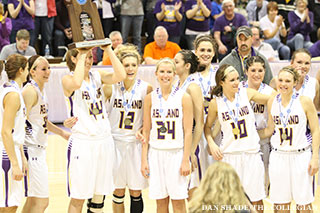
The big question, though, was how bad it is?
Now, it's impossible to say just how big a role all of those prayers played in the ultimate status of Kari Daugherty's knee. But the MRI performed on her knee the next day showed only a strain, no major damage. She would be out four to six weeks, the team said, but even Ramsey admitted that if the conference tournament had started the next day, Daugherty would have been on the floor.
She sat out eight games. The Eagles won their first six without her, the closest game being an 18-point victory over Walsh. Then they traveled to Findlay. And lost by 15 while Daugherty sat on the bench, helpless.
The Eagles played one more game on the road, a convincing 26-point win over Hillsdale. Then returned home with Daugherty in the lineup. In her first game back after missing four weeks, Daugherty led both teams with 18 points. She also grabbed nine rebounds. She did all of this while playing just 21 minutes.
Daugherty says she had a lot of conversations with God about her knee injury. Why did it happen? She had never missed a game of basketball, going all the way back to the eighth grade. And now she was missing eight in her senior year. In the year she was supposed to bring a national championship to Ashland University, and with it, all of the glory to God.
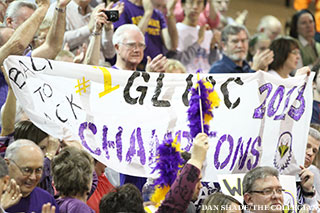
But she learned something sitting on the bench and cheering on her team.
She wants to coach someday. Just like her mom and her dad. She didn't realize that until she took a step away from the game, however forced it was.
"The Bible says so many times, you go through many trials and suffer greatly so your faith can be tested and proved genuine," she says. "To come back and play and almost be back to where I was, I'm very blessed. Not many players have an injury toward the end of their senior year and still come back. So many people say it was a blessing in disguise, but it really did help me learn about myself."
As luck would have it, the Eagles played Findlay for the GLIAC conference championship. And they have Daugherty back. She scored 33 points and grabbed 16 rebounds in the conference tournament semifinals against Michigan Tech, including scoring 10 points in the final 10 minutes, which is when the Eagles pulled away from a pesky Michigan Tech team.
Then the Eagles knocked off Findlay for the title 68-49. They are the No. 1 seed in the Midwest Regional and will be hosting the regional tournament this weekend in Ashland.
Will they win this time? Will they win that regional tournament and advance to the Elite Eight in San Antonio? Will they make it back to the national championship game? Will they win a national championship?
No team in the history of Ashland University has ever won a national championship.
And yet there's faith. Faith on the team. Faith at the university. Faith in the community.
And if it doesn't happen, there's faith too. Faith that whatever does happen is happening for a reason.
-- Follow Matt Tullis on Twitter @matttullis.




